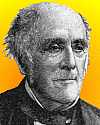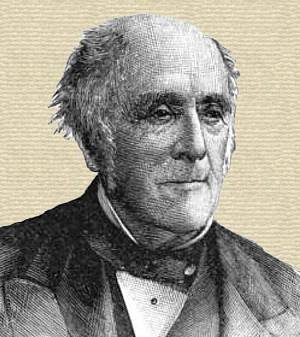 (source)
(source)
|
Thomas Cook
(22 Nov 1808 - 18 Jul 1892)
English travel agent who arranged a special train between Leicester and Loughborough in England on 5 Jul 1841 for a temperance meeting. It is believed to be the first publicly advertised excursion train in England. From this initiative grew the worldwide travel agency Thomas Cook and Son.
|
Thomas Cook.
from Railroad News (1892).
Mr. Thomas Cook, the originator of the excursion system of railway travelling, and founder of the well-known firm of Messrs. Thomas Cook and Son, died at his residence, Thorncroft, Stonegate, Leicester, about midnight on Monday.
Born on November 22, 1808, at Melbourne, in Derbyshire, of very humble parentage, he had in his early years a severe struggle for the bare means of existence. He was only four years old when his father died, and he commenced to earn his daily bread at the age of ten, when he was employed in a village garden at the wage of 1d. a day. At this early age he contrived also to be of material assistance to his mother, who kept a small shop for the sale of books. Soon afterwards he took to hawking fruit and vegetables in Derby market place, and a little later went to learn wood-turning. Afterwards he went to Loughborough, where he entered the employment of Mr. John Winks, a printer and publisher of books in connection with the General Baptist Association. In 1828 be was appointed a Bible reader and village missionary for the county of Rutland, and in the following year he travelled 2,692 miles, of which 2,106 miles were covered on foot.
Having in 1832 married Miss Mason, daughter of a Rutland farmer, he removed to Market Harborough, where, in addition to his work in connection with the Baptist Association, he carried on the business of a wood turner. In 1836 he became a total abstainer, and he was an ardent temperance reformer for the remainder of his life.
In 1841, while walking from Market Harborough to Leicester to attend a temperance meeting, he read in a newspaper a report of the opening of a part of the Midland Counties Railway, and the idea burst upon him that the new means of travel might be used for the benefit of the temperance movement. If, thought Mr. Cook, the railway company could be induced to run a special train from Leicester, many persons might be removed from the temptations of the races and great results might be achieved. He broached the subject to his friends, and arranged with the railway company for a special train to Loughborough on Juy 5, 1841. This, as we have on previous occasions pointed out, the first publicly advertised excursion train, conveyed no fewer than 570 passengers at 1s. each. The event caused great excitement. The passengers were preceded to the Leicester Station by a band of music. At Loughborough they were met by a great crowd of people, and they were welcomed home with equal enthusiasm.
The success of this trip induced Mr. Cook to combine the management of excursions with his book and printing business in Leicester, to which town he had removed. He organised trips to Derby, Nottingham, and Birmingham, and the business having grown so much that in several trips he conveyed between 4,000 and 5,000 people, he in 1844 entered into permanent arrangements with the directors of the Midland Railway to place trains at his disposal whenever they were required while he provided the passengers. Next year saw an extension of the system to Liverpool, the Isle of Man, and Dublin. He also about this period organised a trip to Scotland, and conveyed 350 passengers from Leicester and Nottingham to Glasgow, where the excursionists received a warm welcome. His next move was to provide hotel coupons for his patrons, and Scotland was the field of his first endeavours in this direction. Personsonally conducted tours to Ireland followed, and in 1851 Mr. Cook conveyed many thousands of people to the Great Exhibition in Hyde Park.
The business began to extend in all directions in England and on the Continent. Mr. Cook's ambition was the institution of an annual tour round the world, which he successfully accomplished. His first tour round the world was in 1872, when he, with nine companions, started to make what he termed an exploratory tour. The tour was completed in 222 days. Mr. Cook retired from the firm in 1878, the business being then placed under the sole control of his son, Mr. John M. Cook.
- 5 July - short biography, births, deaths and events on date of Cook's first excursion train.
- Cook's Tours: The Story of Popular Travel, by Edmund Swinglehurst - book recommendation. - book suggestion.
- Thomas Cook: 150 Years of Popular Tourism, by Piers Brendon. - book suggestion.





